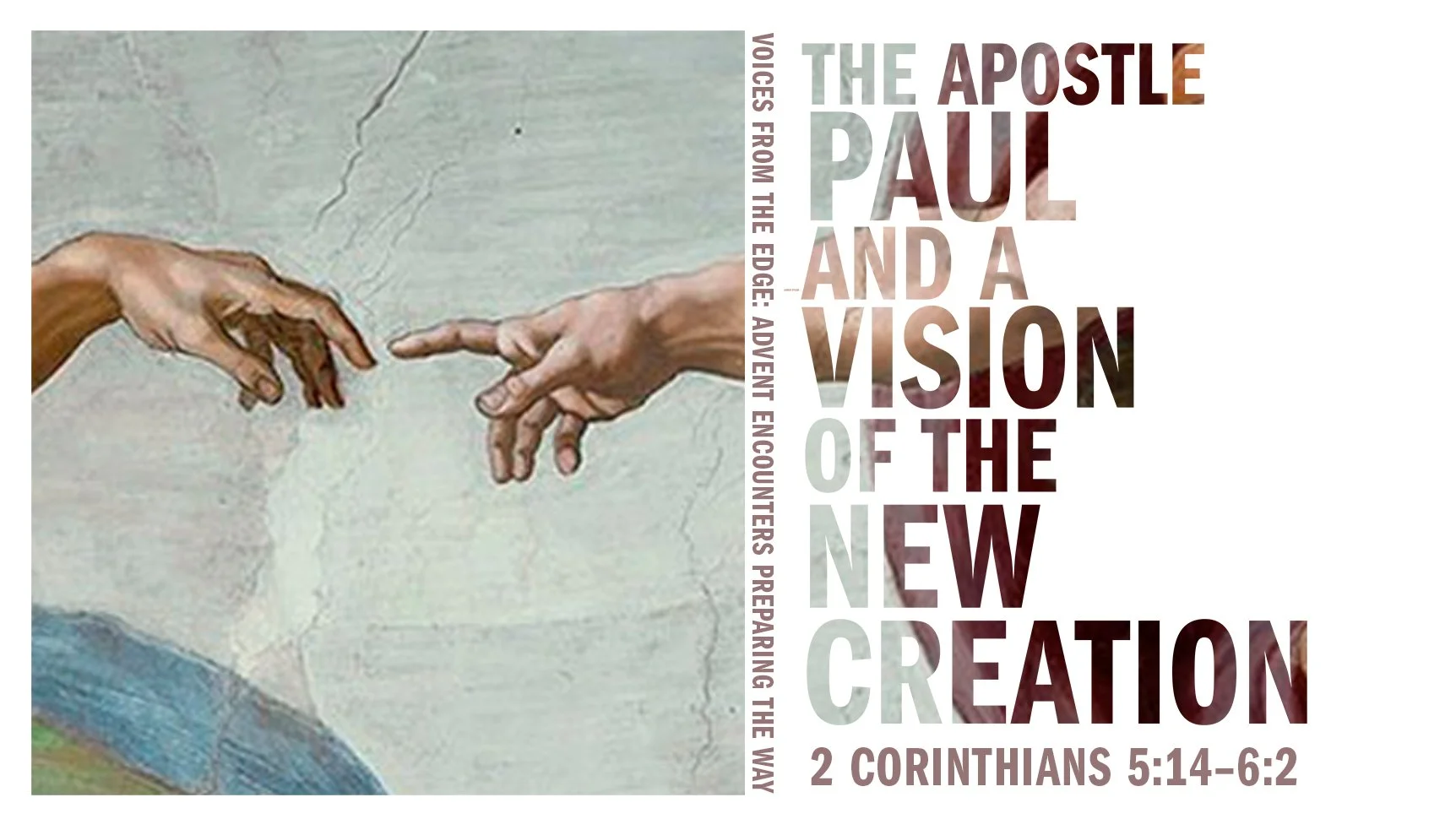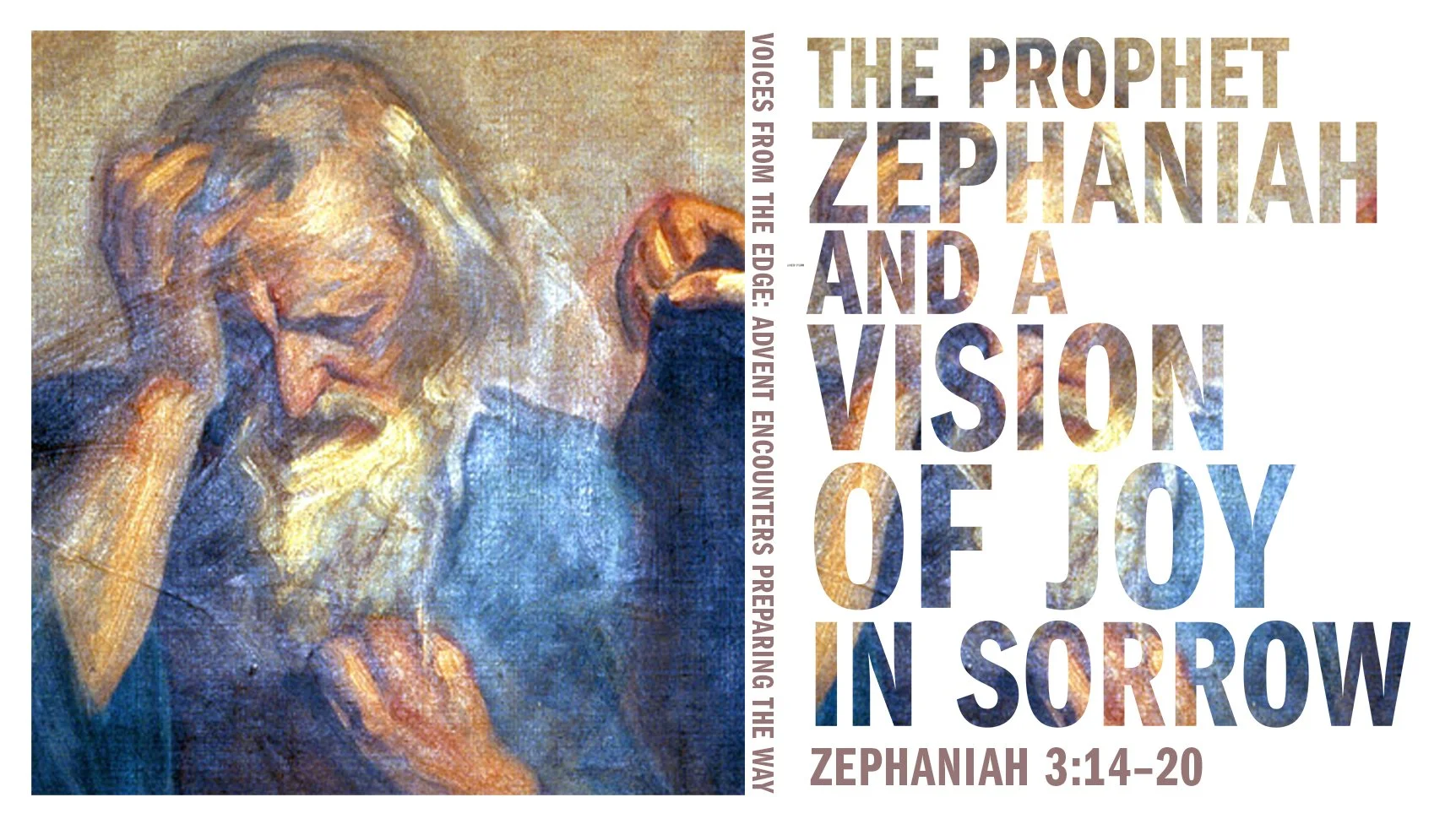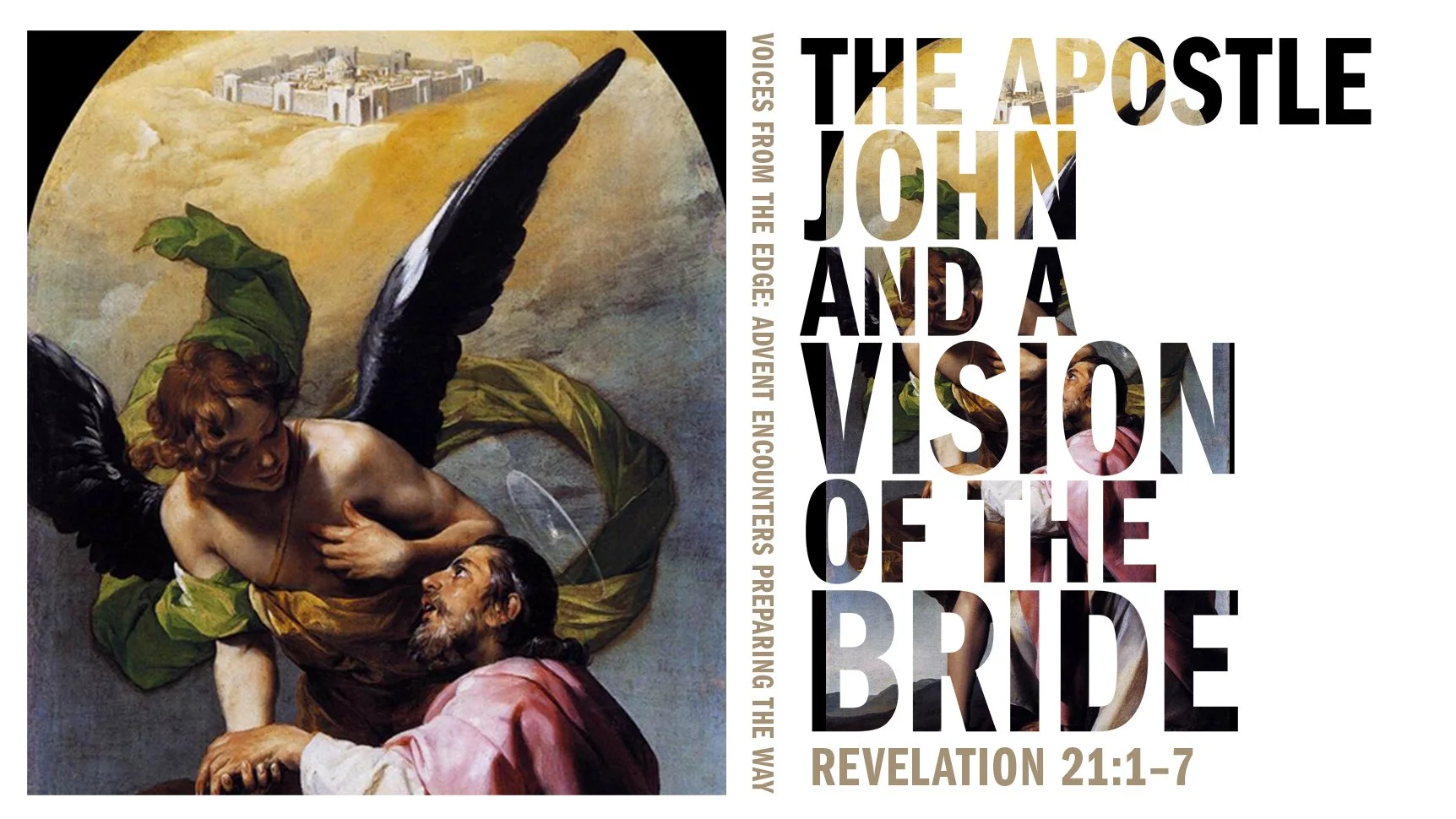The Apostle Paul and a Vision of the New Creation | Fourth Sunday of Advent | 2 Corinthians 5:14-6:2
December 19, 2021 | 10:45 a.m.
Fourth Sunday of Advent
In the season of Advent, there is a distinct turn toward the incarnation that occurs on December 17th. From that point on, the church begins to sing the O Antiphons in preparation for the birth of Christ. One can see this intimate physicality in the petition of the collect. In contrast to Advent 1, where the cry for God to stir up his power envisions a “mighty deliverance,” Advent 4 envisions God helping his people, coming quickly to lift up the sins that burden us and weigh us down. That intimate connection, God and his creation joined in merciful action, is also present in the verse that reminds us that “the virgin shall conceive and bear a son, and they shall call his name Immanuel.”
This fourth sermon focuses upon the apostle Paul and his vision of a new creation in Christ. That vision is infinite, encompassing the restoration of all things, and yet also intimate, centered in the death and resurrection of Christ. Paul is a familiar figure to most Christians but, at this point in his relationship with Corinth, Paul was a voice from the edge. Though far away from the Corinthians both physically and relationally, Paul offers a vision of intimacy: God’s ministry of reconciliation, bringing about a new creation in Christ.
It is that tension between infinity and intimacy, between distance and presence that lies at the heart of this sermon. This voice and this vision invite us to experience a mystery, the ministry of reconciliation and the hope of recreation, as we prepare for our Lord’s birth.
Repentant Reorientation:
In each sermon of this series, a voice from the edge reorients our way of life in the world. In this particular sermon, that reorientation is a change from hurt to hope.
This sermon addresses the following malady: the hurt and hopelessness that occurs as we see how far our world has fallen from the original design of our Creator. While Advent calls us to confess the nearness of God, the world tempts us to feel his distance. On July 20th, a mass shooting occurred in a movie theater in Aurora Colorado. The first funeral for the victims occurred on July 25th. Before the first victim was buried, however, the world was already using this tragedy to foster a debate about God. On July 24th, CNN posted the question “Where was God in Aurora?” on Twitter, eliciting a stream of replies.7 With each public tragedy, the cry goes up “Where is God?” The world wrestles with God’s presence in moments of suffering, and God’s people wrestle too. Suffering tempts us to question God’s presence, deny his providence, and not trust his provision of grace for people in need.
Paul, however, brings a message of hope to God’s people. That hope is centered in Jesus, in the mystery of God bridging the gap between heaven and earth in him. When people stand and glare at the heavens in hopeless anger, crying out “Where is God?,” Jesus comes and bears God’s anger, so that his people can proclaim, “God is here.” God makes himself known in a word of reconciliation, in the waters of baptism, and in his body and blood. His presence gives hope.
The major metaphor for gospel proclamation in this sermon is Paul’s language of a new creation. In contrast to the distance between heaven and earth, Paul celebrates the nearness of God in Christ, entering his fallen creation and bringing about a restoration in him. God has not forgotten his people but claimed them in Christ and God has not forsaken his world but promised a new creation. These actions of God call his people to lives of hope.
READINGS
Psalm 44:4-8
Isaiah 49:8-11
2 Corinthians 5:14-6:2
Luke 4:16-21
Message presented by Rev. Frank C. Ruffatto
+Points to ponder
- What does it mean to be a “new creation in Christ”? Does this idea engender hope for you?
- Why do you think Paul seems so urgent in saying, “now is the favorable time … now is the day of salvation”?
- How can we as a congregation help other to see “the love of Christ that compels us”?
+Sermon Transcript
Grace, mercy, and peace be unto each of you from God our Father and our Lord and King, Jesus the Christ. Amen.
Let us pray: Almighty God, as Your kingdom dawns, turn us from the darkness of sin to the light of holiness, that we may be ready to meet You in our Lord and Savior, Jesus Christ. Amen.
If you stand near the center of the Sistine Chapel and look up, you can see it. The creation of Adam. Perhaps you know the picture. Two hands reaching out toward each other. I’ve seen reproductions of it on coffee cups and greeting cards, umbrellas and even a tie. The tension of the picture lies in that small empty space between two fingers, the finger of Adam and the finger of God. They are about to touch. Heaven and earth, divinity and humanity, eternity and time are about to collide. On the ground, we have Adam, resting. Without soul. Without life. Hand outstretched awaiting a touch from his Creator. In the clouds, we have God, surrounded by angels in a creative rush. His garments are furled. There in his arm is the figure of Eve, a future gift for Adam. Present life and future gifts are suspended there in time as the figure of God rushes toward Adam. And in that moment, as hand reaches out to hand, with the smallest of gaps between the two fingers, we anticipate God’s creative work.
You can stand there, for what seems like eternity, near the middle of the chapel, looking up and waiting for that moment to occur. Waiting like that, with your head tilted back as you look at the ceiling, causes your neck to ache. But it’s better than looking away, because when you turn your eyes away from the ceiling and look out at the world, then you feel an ache in your heart instead.
Look at the world around you and you will see a much larger gap between heaven and earth, between humans and God. This gap occurred after creation, in the fall from grace, and everywhere you look you can see evidence of it. A casual glance at the news will tell you how far humans have fallen from the touch of God. And your heart hurts. There’s the way that elitists in media and the government fuel class warfare, as some feast on exotic dishes on Caribbean cruises while others, the victim of supply-chain shenanigans wonder if there will be food at the local grocery. The rhetoric politically and otherwise fuels anxiety and distrust. The dividing lines get bolder, and people sequester themselves. Sexual deviance, hate crimes, cancel culture ... the news is filled with the stories. It makes your head whirl and your heart ache. People are not resting peacefully on earth like Adam awaiting God’s work. No, the world is a whirl of activity and most of the actions demonstrate how far we have fallen from the touch of God.
But if you close your eyes and listen, you can hear it. A voice from the edge calling out to us, across centuries, asking us to stop and to see and to trust in something wonderful. “Behold, now is the favorable time.” This time of this world with this sin and this destruction? Yes. “Behold now is the day of salvation.” This morning, this place, where these few people have gathered? Yes. “Behold, now is the favorable time . . . now is the day of salvation.” Paul’s words encourage us. He helps our hearts hope more and hurt less as we prepare to celebrate the coming of our Savior into the world.
Yet how can Paul do that? Consider his situation. Paul faced a crisis in Corinth. There was a mess. A mess of the ministry. Paul was not new to the church in Corinth. Paul had been a missionary there. He had stayed with the Corinthians, preaching in their homes, for over a year. He had counseled them in their use of spiritual gifts. He had taught them in their practice of the Lord’s Supper. He had been there, preaching and teaching and encouraging the faithful in this large metropolitan city. But now, there was a mess. A mess of the ministry that had the Corinthians asking, “Why should we listen to Paul?” Paul had become a voice, just a voice from the edge.
A group of false teachers had come into Corinth. They were amazing. Absolutely amazing. If you wanted a preacher who could make your heart sing with his eloquence, these false teachers had it. They were masters of rhetoric. If you wanted a preacher who could hold up his credentials, recommendations from others, these preachers had it. Many were willing to testify that these men were sent by God. If you wanted a preacher who could tell you stories of amazing events, these preachers had it. They claimed visions and revelations and spoke with a personal authority that made you ... well, it made you doubt the apostle Paul and the God Paul preached.
And that is what is so amazing about this letter. Paul, with all of his years of service in the church, with all of the ties and connections he had to this congregation, with all that he could have turned to for hope in this hurtful situation, Paul turns to God. What does Paul say? “For Christ’s love compels us.” Christ’s love. Not Paul’s love. Not Paul’s vision. Not Paul’s leadership. Not Paul’s power. Christ’s love. A love that gives everything, bears everything, loses everything so that everyone might be forgiven and made a new creation by God.
A family once sat there in need of that love. That hope of a new creation. They didn’t know what to do. They had come near the end of their youngest son’s story. He was only fourteen and he had listened. To the world. To its message of freedom and experimentation. And now, there he was. In a drug-dependency unit. Fourteen years old ... and in a drug dependency unit. A seminarian, out on vicarage, went to visit him and the family. With tears in his eyes, the seminarian will tell you, “I didn’t know what to say. I wanted so badly to help out but everything that came to my mind seemed so stupid. What did I know about this kind of stuff? I was just a farmer before I went to the seminary. And here I was, just a vicar. Only there for a year.” He was facing a mess. The mess of human life in this world. His heart ached for the child, for the family. What could he say? What could he point to? Not his skill. Not his experience. Not even his love, as powerful as it was.
But he did have one thing. The story of Jesus. His death and His resurrection. “For Christ’s love compels us.” This is not the only thing he said and, yes, the child had a long struggle after that. But this was a moment, one small moment, when a voice from the edge cried out: “Behold. If anyone is in Christ, he is a new creation.” This fourteen-year-old, drug-addicted child had been claimed by God. He had been touched by God’s hand in baptismal waters, and God would not leave him without hope. Here, even here, in a drug dependency unit, one can see God at work.
The moment of creation captured on the ceiling of the Sistine chapel focuses upon a gap, a space between the finger of Adam and the finger of God. Paul, however, focuses not upon a gap but upon a connection: that day when God became man. That day when the hand of a human was the hand of God. Paul writes, “God was reconciling the world to himself in Christ.” God the Father sent His Son Jesus into this world in mission. God did not simply stand outside of our world, looking down upon us from some heavenly realm, waiting for us to stop sinning and come back to Him. No, God came into our world to seek us and find us. This is what we are preparing to celebrate: Christmas. When God takes upon Himself human flesh. He becomes man and He calls us back to God. His work, however, involves more than simply announcing the kingdom of God, as if that’s all that is needed. No, instead, he actually opens the way. Paul writes, “God made him who knew no sin to be sin for us so that in him we might become the righteousness of God.” The hand of Jesus is the hand of God, touching all of our sin, gathering all of our mess, and being nailed with it ... being nailed by it to a tree. Christ takes upon Himself the wrath of God. He bears the eternal punishment of our rebellion and, through that act, opens for us the heart of His Father. Jesus then rises from the grave and opens for us the hope of a new creation. We now experience the eternal love of God, our Father. A love that will not abandon His children or hold their sins against them but works in their lives and brings about His new creation.
And that is what Paul, a voice from the edge, wants the church to remember. All its days. Not just the church in Corinth. But this church. Our church. Today. Left to ourselves, looking at our world, looking at our lives, our heart will hurt. But Paul intervenes and directs our attention to God. Not on some ceiling far away, but here in our presence. God comes today in an act of reconciliation. He comes to us in His word proclaimed here this morning. He comes to us in His body and blood celebrated at this altar. He comes to us in words on the lips of those he has called and chosen and sent. Relentlessly. Lovingly. Tirelessly. He reaches out His hand to touch you and bring about His new creation. Unlike God’s hand on the Sistine chapel ceiling, this hand is wounded, and its wounds are precious. All of your sin and your suffering, your harmful actions, your hopelessness, your despair, these are taken into the wounded hands of God as he comes today and touches you, bringing about His new creation. “If anyone is in Christ, he is a new creation. The old has gone, behold, the new has come.”
And when you see that ... God’s new creation ... your heart fills with hope. Even as you sit there in a drug-dependency unit and wonder what the future holds. Whatever it is, you have hope in the hand that holds you. No wonder Paul points to this working of God. On the ceiling of the Sistine chapel, you have the act of God’s first creation. It is breathtaking and beautiful and larger than life. But, for many, it is something that they will never see in their lifetime. It’s too far away. In our text from Corinthians, however, you have a much more wonderful working, God’s new creation. It’s not far away but near. It is simple and profound and happens in the most ordinary of circumstances. Even here. Today. God’s hand reaches into this world, with its conflict and suffering and brings about hope. Here. In our midst. For you. And as you enter the world with its hurt, God has given you a message of hope. God can take your voice and make it, like Paul’s, a voice from the edge that shares His gracious work.
This morning, Paul calls us to stop and to open our eyes: behold the wonder of God’s new creation. There, in Corinth. Here, in this place. Out there, in the world. Behold and see. God is bringing about a new creation. With hearts that hope more and ache less, we believe this is only a glimpse of the eternal kingdom of God. Amen.
“May the God of hope fill you with all joy and peace in believing, so that by the power of the Holy Spirit you may abound in hope.”
Advent has long been a time of preparation, preparation for the celebration of Christmas. Yet the road to Christmas is anything but easy. It twists, it turns, and we meet many strange figures along the way. Prophets cry out in visions. John the Baptizer preaches in the desert. Angels appear whether you are asleep or awake. The voices are varied, the places are strange, but one thing is certain: in each encounter, God is preparing us for the celebration of the greatest encounter of all, the birth of Jesus, his Son, our Savior, the Redeemer of the world.






